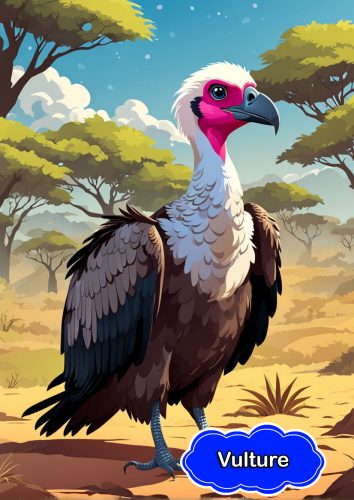
Vultures are fascinating birds with unique adaptations and behaviors. Here are some lesser-known facts about them:
- Highly Specialized Scavengers: Vultures are primarily scavengers, relying on carrion (dead animals) as their main food source. Their keen eyesight allows them to spot carcasses from great distances, but they have a limited sense of smell compared to some other scavengers.
- Digestive Superpowers: Vultures have incredibly strong stomach acids that can digest decaying flesh and kill harmful bacteria and pathogens, including anthrax and botulism. This adaptation allows them to feed on carcasses that would be dangerous for other animals.
- Social Birds: Vultures are highly social and often feed in groups. They use social cues to locate food, with one vulture’s sighting often attracting others. Their communal feeding habits help them efficiently consume large carcasses.
- Unique Nesting Habits: Most vultures do not build traditional nests. Instead, they often lay their eggs on cliff ledges or in rocky crevices. Some species, like the California condor, use tree cavities or other sheltered areas.
- Caring Parents: Vulture parents share responsibilities in raising their young. They take turns incubating the eggs and feeding the chicks, regurgitating food for them until they are old enough to eat solid food.
- Variety of Species: There are about 23 species of vultures, divided into two main groups: Old World vultures (found in Europe, Africa, and Asia) and New World vultures (found in the Americas). Despite their similar roles as scavengers, these two groups are not closely related.
- Cultural Significance: Vultures have significant roles in various cultures and ecosystems. In some cultures, they are considered symbols of death and decay, while in others, they are revered for their ecological importance in cleaning up the environment.
- Conservation Concerns: Many vulture species are facing population declines due to habitat loss, poisoning, and hunting. Conservation efforts are underway to protect these important scavengers and raise awareness about their ecological roles.
These facts highlight the unique adaptations, social behaviors, and ecological importance of vultures, showcasing their vital role in maintaining the health of ecosystems!
More resources:
Animals Coloring and Learning eBook
Animals Free Fun Learning eBook
Notes:
– All materials are strictly for personal use only.
– Do not reproduce and/or redistribute any part of these materials.
– Use these materials under parents’ and/or guardians’ guidance/supervision/approval.
![]()